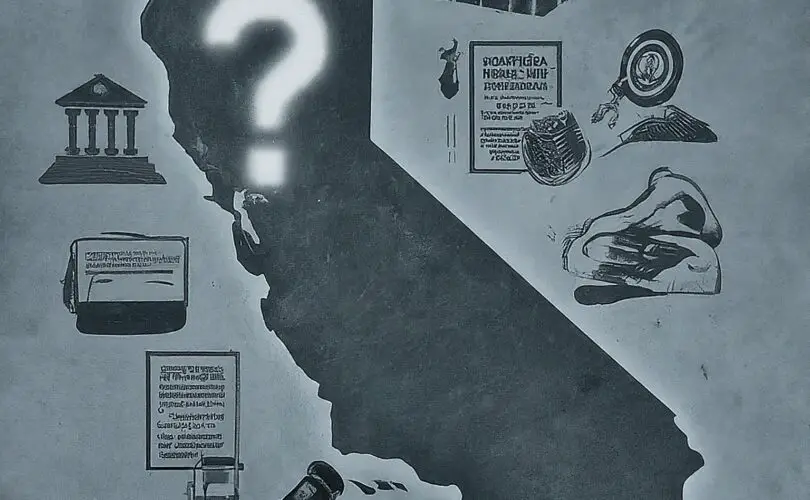By definition, estate taxes are levies imposed on the transfer of wealth from deceased individuals to their heirs or beneficiaries. In the United States, such taxes are primarily governed by the federal legislation. Regarding how they are calculated, the calculations are executed based on the total value of the estate. Hence, the taxes are imposed on estates that exceed a certain exemption threshold. A threshold that is periodically adjusted in order to account for inflation and changes in the economy. With this being the case, does California have an estate tax?
Does California Have an Estate Tax
Despite the nationwide applicability of the federal estate tax, there are states that impose their own estate taxes. These state-specific estate taxes are separate from the federal estate tax and have their own exemptions thresholds and rates.
So, does Californian have an estate tax? No, California does not have a state-specific estate tax. By not having an estate tax, it means that regardless of the size of your estate, you would not owe any state estate tax when you pass away. It is due to this that California is deemed to be a popular destination for high-net-worth individuals who are focused on reducing their estate tax burden.

Although this is the case, the federal estate tax does apply. As of 2024, the federal estate tax exemption stands at $13.61 million per individual, meaning that estates below the value do not owe any federal estate tax either. In case an estate exceeds the amount, it would be subject to the federal tax on the amount above the exemption. Therefore, with California adhering to the federal estate tax laws, any estate value exceeding the federal exemption threshold is subject to federal estate taxes.
Related Article: Does a Screened-In Porch Increase Property Taxes
Estate Tax Exemptions and Rates and Minimization Strategies
In California, the threshold of the federal estate tax exemption is quite high. What this implies is that most estates are not subject to federal estate taxes. For the year 2021, the federal estate tax exemption was set at $11.7 million for people and $23.4 million for married couples. These exemption thresholds are subject to change as time goes by.
Despite California lacking state-specific estate tax, there are techniques/strategies that can be employed in order to minimize the estate tax liability. Among them is making use of annual gift tax exclusions. The federal government does permit people to gift a certain amount of money or assets to other people each year, without incurring gift taxes. As an approach of reducing the overall value of an estate and gradually transferring wealth, this is an effective way. The chances of other people noticing or rather understanding what is happening are very low.
Misconception Regarding Estate Taxes
Information is power, but the correct information compass and a scalpel. It is a compass because, with the correct information, you would be able to navigate uncertainties and make informed choices/decisions, without dictating a rigid path. On the other hand, it is a scalpel as it would assist you in dissecting complex issues with precision and revealing nuanced solutions.

Some of the common misconceptions/inaccurate information that people hold about estate taxes in California include:
Misconception 1
I don’t have to worry about estate taxes since California doesn’t have them.
Reality: While true, you still need to consider the federal estate tax. The current exemption is high at $13.61 million in 2024, but if your estate exceeds that, you’ll be subject to the federal tax. Additionally, other taxes might apply, like income tax on post-death income and capital gains on appreciated assets.
Misconception 2
Only the wealthy need to worry about estate taxes.
Reality: Even with no California estate tax, estate planning is crucial for everyone. Probate (the court process for distributing assets) still occurs for most estates, regardless of size, and can be lengthy and expensive. Having a will or trust can streamline the process and minimize stress for your loved ones.
Misconception 3
Having a will avoids estate taxes and probate.
Reality: Having a will dictates who receives your assets, but it doesn’t necessarily avoid probate or estate taxes. Only assets not held jointly or in trusts go through probate, and the total value of your estate determines tax liability, not having a will.
Misconception 4
Putting assets in joint tenancy bypasses taxes and probate.
Reality: While joint tenancy avoids probate for those assets, it can create other issues. The surviving owner automatically inherits the asset, regardless of your wishes, and it exposes the asset to their creditors. Additionally, adding someone as a joint tenant might trigger gift taxes.
Misconception 5
Estate planning is only for the elderly.
Reality: No matter your age, estate planning helps ensure your wishes are respected and protects your loved ones. It’s especially important for young families with dependents and those with unique assets like digital property.
Tips for Estate Tax Planning
In minimizing estate tax liability, a California resident ought to:
1. Review and update your estate plan regularly to ensure it aligns with the latest tax laws and regulations.
2. Explore gifting strategies to gradually transfer your wealth and reduce the value of your estate.
3. Consider establishing a trust to protect your assets and potentially reduce estate taxes.
4. Consult with a qualified financial advisor to develop a comprehensive estate tax plan tailored to your specific needs and goals.
Conclusion
While California lacks a state-specific estate tax, residents ought to understand the implications of federal estate taxes. In order to make sure that an estate is protected and tax liability is minimized, make an attempt to consult with an estate planning attorney. Such personnel would assist you in understanding the intricacies of estate law and establish a comprehensive plan to minimize tax liability.








